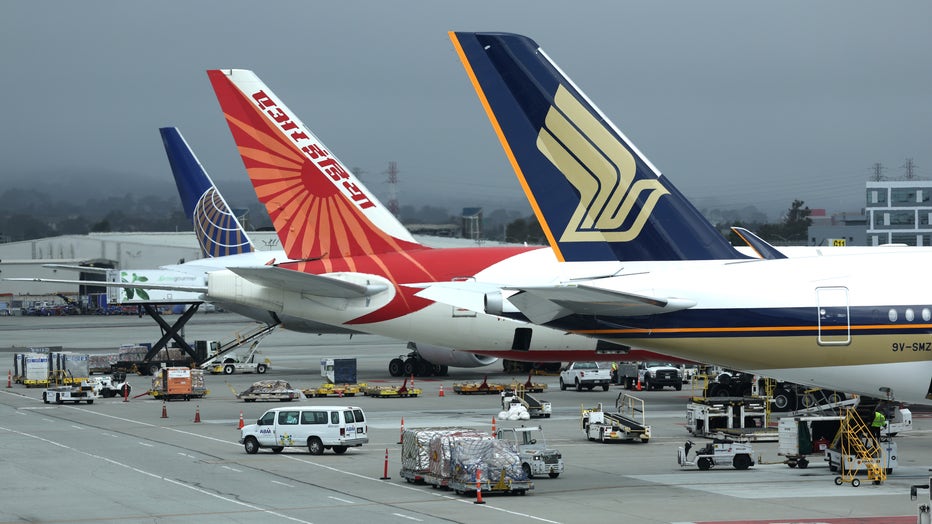July 4th travel: Thousands of flights canceled on busy holiday weekend; more expected
Thousands of flights have been canceled during the July 4th holiday weekend as airlines struggle to keep up with travel demand that’s meeting pre-pandemic levels.
As of 10 a.m. Eastern Sunday, more than 1,350 flights had been canceled.
On Friday, more than 3,000 flights were canceled and nearly 30,000 flights were delayed, according to FlightAware. That’s on top of more than 2,600 flights canceled Thursday. American Airlines canceled 8% of its flights on Tuesday and Wednesday, and United Airlines scrubbed 4% of its schedule both days.
Saturday, more than 2,400 flights had been canceled and nearly 25,000 were delayed.
CNBC reported Saturday that more than 12,000 American Airlines flights in July were without a scheduled captain, first officer, or both after pilots were able to drop assignments through a glitch in the scheduling platform, FOX Business reported. American said the glitch isn't expected to have any "operational impact."
RELATED: Flight attendant bluntly shares travel tips: ‘We will not help you if you are mean’
AAA predicts 47.9 million people will travel between Friday and Monday, and about 3.55 million of those will fly. Delta Air Lines even took the unusual step this week of warning travelers that there could be problems over the holiday weekend.
The airline also reportedly offered passengers $10,000 to get off an overbooked flight from Michigan to Minnesota earlier this week.
What’s causing flight delays and cancellations?

Planes sit parked at their gates at San Francisco International Airport on July 01, 2022 in San Francisco, California. (Photo by Justin Sullivan/Getty Images)
Widespread delays and cancellations have been happening since before Memorial Day weekend. Airlines have been caught short-staffed as they try to hire thousands of workers, including pilots, to replace those who they encouraged to quit when the pandemic caused air travel to plummet.
Collectively, airlines have cut 15% of flights planned through the peak summer months, FOX Business reports.
They're also using larger planes on average to carry more passengers with the same number of pilots, but it hasn’t been enough so far this summer.
The airlines are increasingly trying to blame delays on understaffing at the Federal Aviation Administration, which manages the nation's airspace and hires air traffic controllers.
Transportation Secretary Pete Buttigieg has pushed back on those claims.
RELATED: Delta pilots picket at Atlanta airport to protest working conditions
"The majority of cancellations and the majority of delays have nothing to do with air traffic control staffing," Buttigieg told "NBC Nightly News."
Helane Becker, an airline analyst for investment firm Cowen, said there are many reasons for the disruptions including weather, FAA ground stops that last too long, and flight crews hitting their legal limit of working hours in a day. The airlines "seem to fail" when it comes down to daily operations, and the FAA didn't train enough new air traffic controllers — a process that can take up to four years — to offset retirements.
U.S. could take action against airlines
Buttigieg has threatened fines if airlines don't fix their operations, and some lawmakers are calling for more.
Sen. Bernie Sanders, I-Vt., urged Buttigieg to require airlines to issue refunds for delays longer than an hour and fine them for delays longer than two hours and for scheduling flights that they can't staff. Sanders accused airlines of stranding passengers while charging "outrageously high prices."
Sens. Edward Markey, D-Mass., and Richard Blumenthal, D-Conn., asked 10 airline CEOs this week to "take immediate action" to reduce travel disruptions. The senators demanded information about how each airline decides which flights to cancel and the number of consumer refunds requested and granted.
Biggest crowds since the pandemic began
About 2.49 million passengers went through security checkpoints at U.S. airports Friday, surpassing the previous pandemic-era record of 2.46 million reached earlier in the week, according to figures released Saturday by the Transportation Security Administration.
Friday's passenger volume marked a 13% increase from July 1 last year, which fell on the Thursday before Fourth of July. This year's number of passengers going through U.S. airports also eclipsed the 2.35 million screened at security checkpoints on the Friday before the Fourth of July in 2019, but that was nearly a week ahead of Independence Day.
In a more telling sign of how close U.S. air travel is reverting to pre-pandemic conditions, an average of 2.33 million passengers have passed through security checkpoints at domestic airports during the seven days ending July 1. That was close to the seven-day average of roughly 2.38 million passengers during the same 2019 period, according to the TSA.
The Associated Press and FOX’s Daniel Miller contributed to this report.

